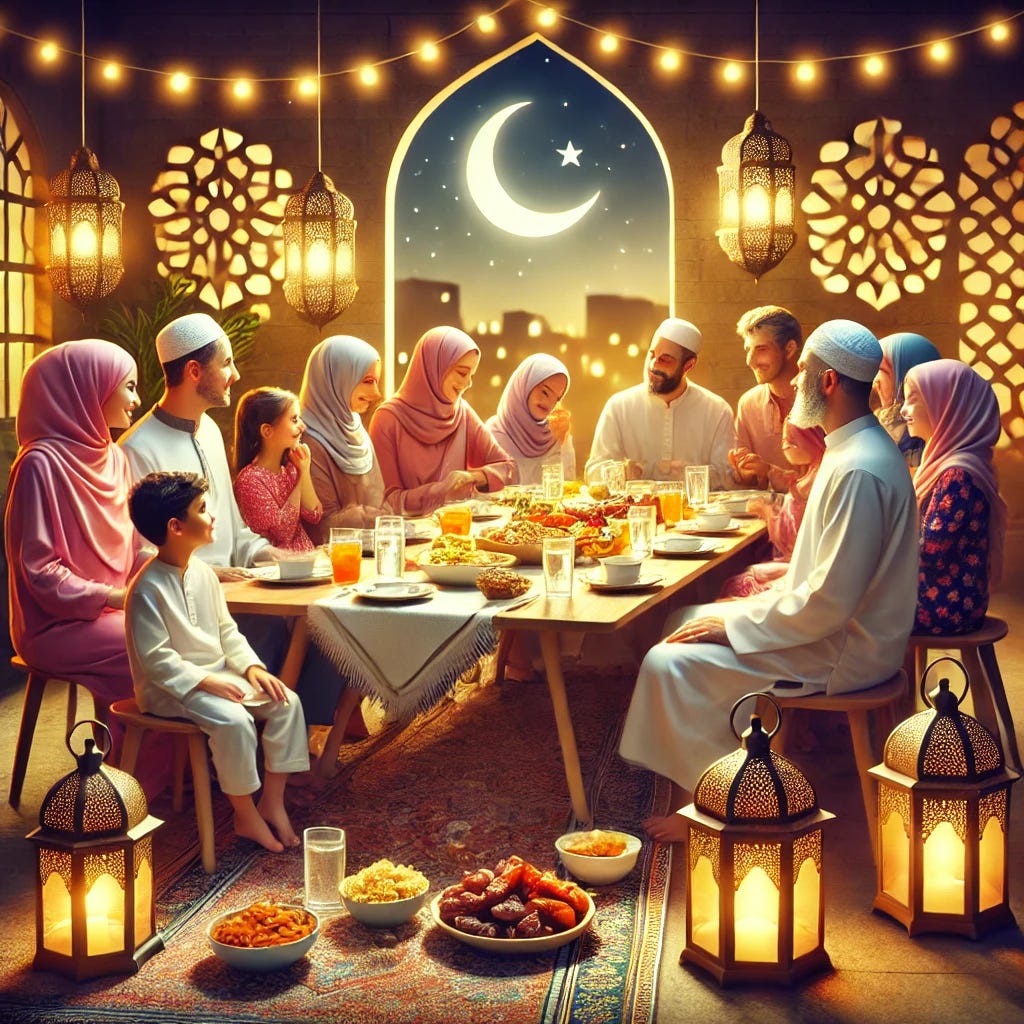'Not Even Water?!' And Other Questions I’ve Been Asked About Ramadan
Navigating Ramadan in a new culture can be a challenging experience. Here's a look at my journey and a collection of FAQs about Ramadan for non-Muslims that can help foster an inclusive environment.
Coming to Europe from Pakistan, one of the things that initially hit me and made me extremely homesick was how different Ramadan felt here.
In Pakistan, Ramadan is everywhere. It’s not just a religious practice but a shared experience. Shops and restaurants adjust their hours, workplaces accommodate fasting employees, and even those who aren’t fasting avoid eating or drinking in public out of respect — the entire rhythm of life shifts.
Every household wakes up before dawn for suhoor (the pre-dawn meal). In older times, a night watchman would walk the streets, loudly beating a drum to wake people up. When I was young, we’d listen for the Azaan (call to prayer) from our local mosque to signal the start and end of the fast. Later, we switched to TV broadcasts for accurate timings, and now, like everything else, our mobile phones do the job.
Ramadan is deeply spiritual, but beyond that, it’s a communal experience—a time of togetherness and unity. But when you’re the only one fasting in your surroundings, that feeling of community can feel distant.
Navigating Ramadan in a Non-Muslim Environment
In my first few years in Europe, I hesitated to mention that I was fasting. When colleagues invited me to lunch or offered a snack, I would politely decline without any explanation.
I worried about being seen as different or dealing with awkward questions.
As I gained confidence, I became more open about it. Yet, even now, I still encounter the wide-eyed expressions when I answer the inevitable question:
“Not even water?!”
While awareness of Ramadan has grown worldwide, I believe there’s still a lot that people would benefit from understanding. So, here are some common questions I’ve received about Ramadan over the years:
Ramadan FAQs
🔹 What is Ramadan?
Ramadan is the ninth month of the Islamic calendar, during which Muslims fast from dawn to sunset as an act of faith, self-discipline, and spiritual reflection.
🔹 Why does Ramadan fall on different dates each year?
The Islamic calendar follows the lunar cycle, meaning Ramadan shifts about 10 days earlier each year based on moonsighting.
🔹 I know a Muslim who isn’t fasting. Why?
Not all Muslims fast. Some are exempt—children, the elderly, pregnant, menstruating or nursing women, travelers, or those with medical conditions. Others may choose not to fast for personal reasons, as religious observance is an individual choice.
🔹 Don’t you get dehydrated?
If you eat and drink properly during suhoor and iftar (the evening meal), your body adjusts. If someone does feel unwell, they are allowed to break their fast and seek medical advice.
🔹 It sounds really hard. How do you do it?
The first few days can be tough—headaches, fatigue, and adjusting to a new rhythm. But what keeps us going is the deeper spiritual connection and sense of purpose Ramadan brings.
🔹 Can you still work while fasting?
Yes! Energy levels can fluctuate, some days and timings are harder than others. Being open about it helps, and having an understanding work environment and flexibility is a true blessing.
🔹 Do children have to fast?
Fasting is only required after puberty, but kids love to join in! There is something magical about the whole experience, and having special treats for the iftar meal makes it an attractive activity.
Fostering Inclusion in the Workplace
For those working with Muslim colleagues during Ramadan, small gestures can go a long way:
✔ Be mindful when scheduling meetings & team events.
✔ If possible, offer flexible working hours to accommodate energy levels.
✔ A simple “Ramadan Mubarak” (Happy Ramadan) is always appreciated!
✔ Empathize, but don’t sympathize—Muslims take pride in fasting, so avoid pitiful remarks or comments.
Ramadan is about much more than just abstaining from food and drink—it’s a time for self-reflection, gratitude, and connection.
Have you experienced Ramadan in a different culture or have more questions about it? Share them in the comments.






A great reflection. I agree that as Muslims immigrating to non-Muslim countries, they must learn to navigate questions, embrace curiosity, and foster understanding. This also provides an opportunity for dawah work, allowing Muslims to prepare thoughtful answers and engage in meaningful conversations. Also, one key difference in the experience of Ramadan in non-Muslim countries is the strong communal bond formed in local masajid, where it's not uncommon for many Muslims (even families) to gather for iftar. From what I understand, this practice is not as common in Muslim-majority countries, where iftars are often held at home with family.
I can completely relate to this. Experiencing Ramadan in Europe for the first time was a mix of emotions—gratitude for the experience, but also an overwhelming sense of homesickness. The absence of the familiar calls to prayer, bustling iftar gatherings, and the shared community spirit made me realize how deeply intertwined Ramadan is with home. Your post beautifully captures that feeling, and I truly appreciate you sharing your journey.